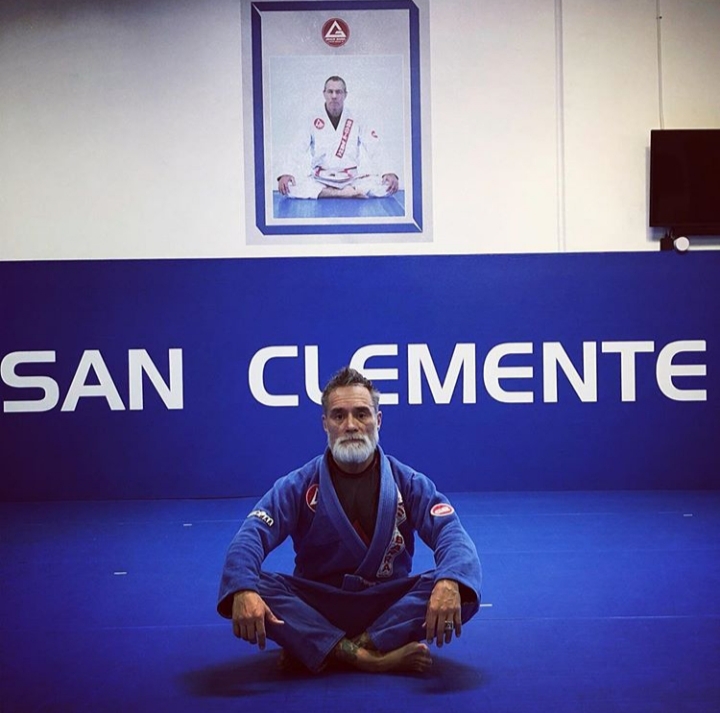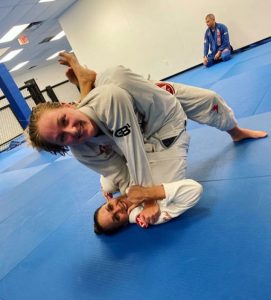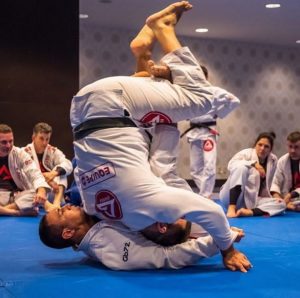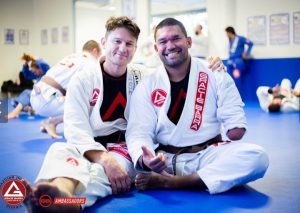Training for Jiu-Jitsu Longevity
Discussing training frequency and intensity with a new student of Jiu-Jitsu, the talk turned to the challenge to train hard yet at the same time remain injury free and stay on the mats and not miss classes.
It is not uncommon for serious students of Jiu-Jitsu to compare various aches and pains sitting around on the mats at class. A certain amount of wear and tear, bumps and bruises seem to go along with hard training in a combat sport.
ㅤ
The discussion turned to how to make sure that we can stay training in Jiu-Jitsu over the long haul? Jiu-Jitsu longevity.

ㅤ
Many students of Jiu-Jitsu naturally adapt their general lifestyle outside of the Gracie Barra school to a more healthy, overall way of living – which contributes to their ability to stay healthy and continue to train over months and years.
ㅤ
The students asked a great question: “What advice do you have for staying in Jiu-Jitsu for a long time?”
They explained that they loved Jiu-Jitsu and intended to keep training to black belt and beyond and were looking for specific suggestions on how they could avoid dropping out.
ㅤ
Here are 4 tips that contribute to your longevity in Jiu-Jitsu.
ㅤ
 1) Have fun. We can become so focused on our training goals (and the obstacles and frustrations associated with working hard) that we can begin to view training sessions as a grim duty. This view can lead to mental burnout. At these times, we must remind ourselves to have fun at training! Focus on learning some new positions, work with your favorite training partners, stay in touch with those reasons why you started training in the first place.
1) Have fun. We can become so focused on our training goals (and the obstacles and frustrations associated with working hard) that we can begin to view training sessions as a grim duty. This view can lead to mental burnout. At these times, we must remind ourselves to have fun at training! Focus on learning some new positions, work with your favorite training partners, stay in touch with those reasons why you started training in the first place.ㅤ
2) Careful with the inversions. I know of several Jiu-Jitsu students who have had to suspend their training due to neck and back pain – and that pain is largely due to playing too much of the inverted position when on bottom. Master Carlos Gracie Jr. even talks about this specifically with respect to practicing Jiu-Jitsu over the years:
ㅤ
Master Carlos Gracie Jr. source: Grace Mag interview

ㅤ
“I don’t get this obsession with all of the acrobatic guards. They are efficient, sure. But they’re fleeting. Your body has difficulty understanding them for too long. I say this from my own experience. The lumbar region, for example, as strong as it may be, will never be armored against the passage of time. Jiu-Jitsu is for your whole lifetime, and by that line of reasoning you can rest assured that the basic techniques like the closed guard or this open guard I enjoy doing, will never abandon us. At 70 we’ll still be capable of performing them with plenty of mobility. That can’t be said of the tornado guard or the berimbolo.”
ㅤ
3) Eat healthy. Those Jiu-Jitsu athletes over the age of 30 will know what I’m talking about here. After a certain age, our metabolism slows. We can no longer eat anything that we want with impunity. Aches and pains do not heal as quickly. We experience more difficulty recharging our batteries in between classes. This is when we need to examine our nutrition and pay attention to the quality of our weekly nutritional intake. After adequate quality sleep, eating a clean diet is the biggest factor in your ability to recuperate from minor injuries and the physical demands that training Jiu-Jitsu asks of our bodies. Eating well is a cornerstone of the Jiu-Jitsu lifestyle. This is not exactly a newsflash, but how many people are eating enough fresh vegetables? Ask yourself: Does my diet include a sufficient amount of fresh vegetables to support my training efforts?
ㅤ
 4) Allow injuries to heal fully. This is a mistake that is prevalent among highly motivated students of Jiu-Jitsu: that is incurring a training injury and returning too soon to high intensity training. The body has not had adequate time to heal the injury and the injury continues to malinger for what feels like forever. And even worse, it can get injured even worse making it even more serious. You go to class still injured and, overcome by your enthusiasm to get back in there, say to yourself “Well I’ll just roll a little bit…” OUCH! You just aggravated the still tender injured area and set yourself back further. It requires a tremendous amount of self discipline to stay off of full activity until your injury is adequately healed. Don’t worry…all of your skills won’t evaporate during a brief (but necessary!) break from training. A chronic injury WILL derail your Jiu-Jitsu training.
4) Allow injuries to heal fully. This is a mistake that is prevalent among highly motivated students of Jiu-Jitsu: that is incurring a training injury and returning too soon to high intensity training. The body has not had adequate time to heal the injury and the injury continues to malinger for what feels like forever. And even worse, it can get injured even worse making it even more serious. You go to class still injured and, overcome by your enthusiasm to get back in there, say to yourself “Well I’ll just roll a little bit…” OUCH! You just aggravated the still tender injured area and set yourself back further. It requires a tremendous amount of self discipline to stay off of full activity until your injury is adequately healed. Don’t worry…all of your skills won’t evaporate during a brief (but necessary!) break from training. A chronic injury WILL derail your Jiu-Jitsu training.ㅤ
Remember, you are in Jiu-Jitsu for the long term. Practice these habits and you will ensure your involvement in Jiu-Jitsu for years to come.
ㅤ
See also on Gracie Barra : The 3 Types Of Training Partners We Need
ㅤ
Credits: Mark Mullen
Gracie Barra Black belt based in Asia
